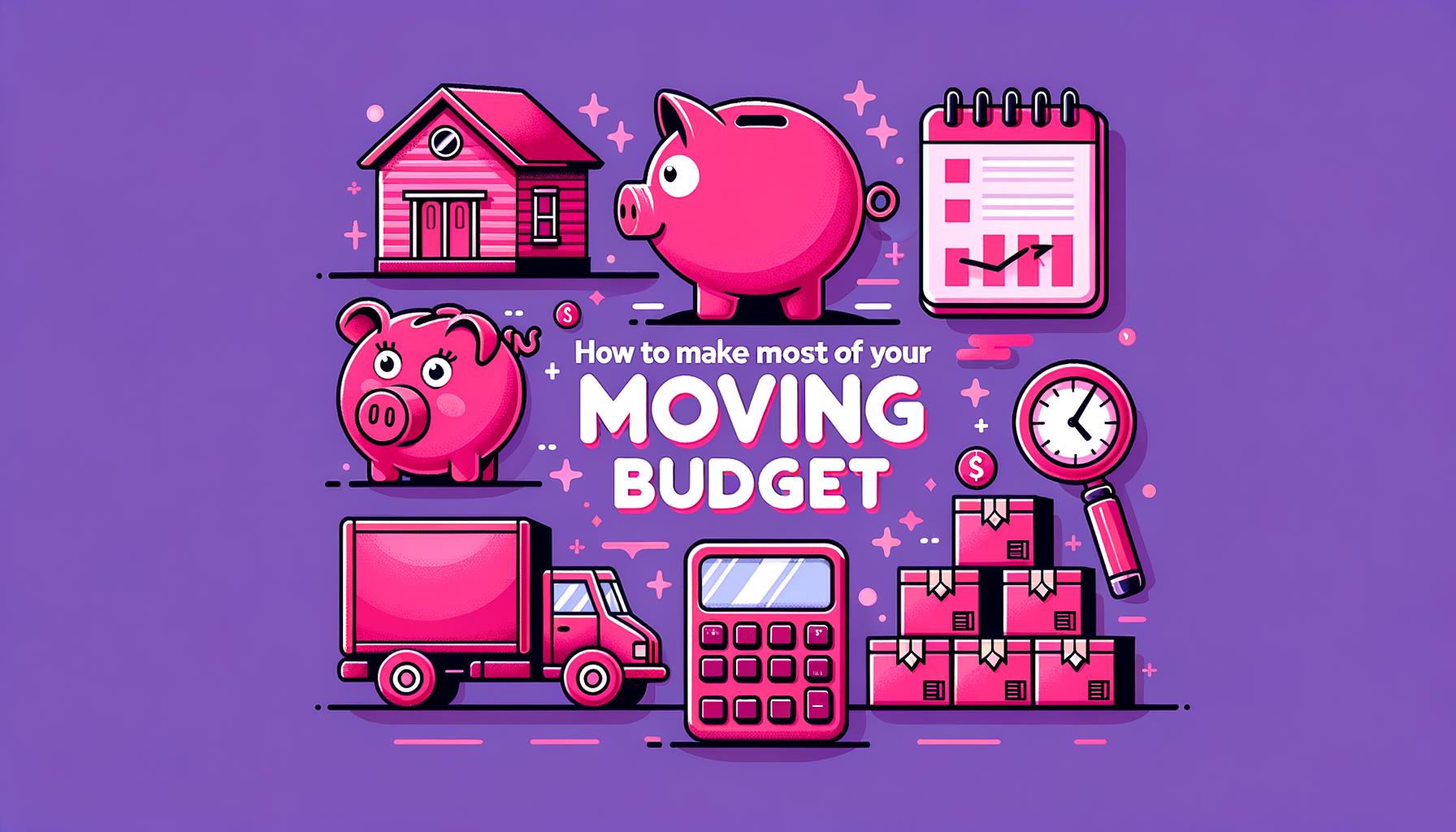 How to Make the Most of Your Moving Budget
How to Make the Most of Your Moving Budget
Moving can be an expensive endeavor, but with proper planning and a little bit of know-how, you can make the most of your moving budget. In this article, we will discuss the key components of a moving budget, how to plan your budget, ways to save on moving costs, how to maximize your budget before and after the move, and exclusive moving on a budget tips. Plus, we’ll cover important post-move budget considerations to ensure a smooth transition into your new home.
Understanding Your Moving Budget
Before diving into the details, it’s important to understand why having a moving budget is crucial. A moving budget not only helps you stay organized but also gives you a clear idea of how much you can afford to spend on the move. This allows you to prioritize your expenses and make informed decisions along the way.
When it comes to planning a move, there are many factors to consider. From finding a new place to live to packing up your belongings, the process can be overwhelming. However, by creating a comprehensive moving budget, you can alleviate some of the stress associated with the financial aspect of the move.
The Importance of a Moving Budget
A moving budget helps prevent overspending and ensures that you have enough funds allocated to cover all the necessary expenses. By having a clear budget in place, you can avoid unnecessary financial stress and focus on making your move as smooth as possible. It also acts as a guideline for tracking your expenses and making adjustments if needed.
Having a moving budget allows you to have a realistic view of your financial situation and helps you determine how much you can afford to spend on different aspects of the move. By setting a budget, you can avoid going into debt or draining your savings account.
Key Components of a Moving Budget
When creating your moving budget template, consider the following key components:
- Transportation: Estimate the costs associated with hiring a moving company or renting a truck if you plan on doing a DIY move. Transportation costs can vary depending on the distance of your move and the amount of belongings you have. If you decide to hire a moving company, research different companies and request quotes to get an accurate estimate of the cost. If you choose to rent a truck, consider the distance you’ll be traveling and the cost of fuel.
- Packing Supplies: Don’t forget to include the cost of boxes, tape, bubble wrap, and other packing materials. When it comes to packing supplies, it’s important to have enough materials to protect your belongings during the move. Consider the size and fragility of your items when determining the quantity of supplies you’ll need. Additionally, you may want to invest in specialty boxes for items such as mirrors, artwork, or electronics.
- Insurance: Consider purchasing moving insurance to protect your belongings during transit. Include the cost in your budget. Moving insurance provides peace of mind by offering financial protection in case of any damage or loss during the move. Research different insurance options and consider the value of your belongings when deciding on coverage. Include the cost of insurance in your budget to ensure that you are adequately protected.
- Travel Expenses: If you’re moving long-distance, factor in the cost of gas, meals, and accommodations. Long-distance moves often involve additional travel expenses. Consider the distance you’ll be traveling and estimate the cost of gas, meals, and accommodations if necessary. It’s important to include these expenses in your budget to avoid any surprises along the way.
- Storage: If you need to store your belongings temporarily, account for the cost of a storage unit. In some cases, you may need to store your belongings temporarily before or after the move. If this is the case, research storage facilities in your area and include the cost of a storage unit in your budget. Consider the size of the unit you’ll need and the duration of storage when estimating the cost.
Planning Your Moving Budget
Once you have a clear understanding of the key components, it’s time to start planning your moving budget. Here’s how:
Estimating Moving Costs
Research moving companies or rental truck prices in your area and request quotes. Take into account factors such as distance, the size of your home, and any additional services you may require. Compare prices and choose the option that fits your budget and needs.
Moving costs can vary greatly depending on various factors. If you are moving locally, you may opt for a DIY approach by renting a truck and doing the packing and moving yourself. This can save you money but requires more effort on your part. On the other hand, hiring professional movers can make the process more convenient but can be more expensive.
When estimating the cost of a professional moving company, consider the size of your home. Larger homes generally require more movers and more hours of work, resulting in higher costs. Additionally, if you have any specialty items such as pianos or antiques, the moving company may charge extra fees for their safe handling and transportation.
It’s also important to factor in the distance of your move. If you are moving locally, the cost may be based on an hourly rate. However, if you are moving long-distance, the cost may be calculated based on the weight of your belongings and the distance traveled.
Allocating Funds for Unexpected Expenses
Unexpected expenses are common during a move, so it’s important to set aside some extra money for any unforeseen circumstances. This can include last-minute packing supplies, minor repairs in your new home, or even unexpected utility deposits.
When moving, it’s common to realize that you need additional packing supplies that you didn’t anticipate. Boxes, bubble wrap, packing tape, and other materials can add up quickly. It’s always a good idea to have a surplus of these supplies to avoid any last-minute scrambling.
In addition to packing supplies, unexpected repairs in your new home may arise. It’s not uncommon to discover minor damages or issues that need to be fixed before settling in. Allocating funds for these repairs can help alleviate any financial stress that may arise during the moving process.
Another unexpected expense to consider is utility deposits. When moving to a new place, you may be required to pay a deposit for utilities such as electricity, water, or gas. These deposits can vary depending on your location and the specific utility company’s policies.
By allocating funds for these unexpected expenses, you can ensure that you are financially prepared for any surprises that may come your way during the moving process.
Saving on Moving Costs
Moving costs can add up quickly, but there are several ways to save money during the process:
DIY Moving vs. Hiring Professionals: A Cost Comparison
Consider whether a DIY move or hiring professionals makes more financial sense for you. While a DIY move may seem cheaper upfront, there are hidden costs to consider, such as fuel, food, and potential damage to your belongings. Compare prices and weigh the pros and cons before making a decision.
Tips for Finding Affordable Moving Services
If you decide to hire professionals, do your research to find affordable moving services. Request quotes from multiple companies, read reviews, and ask for recommendations from friends or family. Look for any available discounts or promotions that might help you save on the overall cost.
Maximizing Your Moving Budget
Now that you’ve planned your budget and found ways to save, it’s time to maximize your moving budget:
Negotiating with Moving Companies
Don’t be afraid to negotiate with moving companies. Ask if they can offer any discounts or if there’s room for negotiation. Sometimes, simply asking can lead to cost savings.
Selling Unwanted Items Before the Move
Downsizing before the move not only saves you money on transportation costs but also allows you to make some extra cash. Sell or donate unwanted items to declutter your home and boost your moving budget.
Post-Move Budget Considerations
Your budgeting efforts should not end once the move is complete. Consider the following post-move budget considerations:
Setting Up Your New Home on a Budget
When settling into your new home, it’s important to be mindful of your budget. Prioritize essential expenses such as utilities, rent or mortgage payments, and grocery costs. Take advantage of sales or second-hand stores for furniture and decor to furnish your new space without breaking the bank.
Dealing with Post-Move Financial Changes
After the move, reassess your monthly budget to accommodate any changes. This may include new transportation costs, service providers, or even a change in monthly expenses such as rent or mortgage payments. Adjust your budget accordingly and make sure to track your expenses diligently.
By understanding and implementing these strategies, you can make the most of your moving budget and ensure a successful and cost-effective relocation. Plan ahead, stay organized, and be proactive in finding ways to save money – your wallet will thank you.
